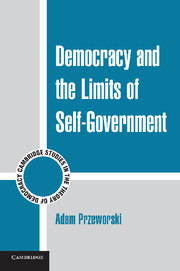Book contents
Preface
Published online by Cambridge University Press: 05 June 2012
Summary
This book has autobiographical roots and they may help explain its motivation and its goals.
Growing up in communist Poland, I imagined democracy only dimly across a curtain, attracted mostly by the thrill of elections: parties compete, someone wins, someone loses, and even if their chances are unequal, no one knows how the game will end. It was like football, and I was passionate about football. So I read results of elections in foreign countries the same way I read scores of foreign soccer games. And, to increase the emotional stakes, I had my favorites in both: Swedish Social Democrats and Arsenal.
I was first exposed to democracy during the two years I spent in the United States between 1961 and 1963. Although the first textbook I was forced to read as a graduate student opened with the sentence “The United States has the best system of government in the world,” the experience was not inspiring. Still recovering from McCarthyism, the country was not the bastion of freedom it portrayed itself to be. I even had a personal adventure: A group of graduate students planned to picket a movie theater that would not show a sexually explicit foreign film. To organize the picket, we formed a political group, Student Association for Liberal Action. Then the leader of the group received a call from the local police chief, who met him at midnight in an underground garage and pointed out that our leader had several unpaid parking tickets, thus being liable to arrest.
- Type
- Chapter
- Information
- Democracy and the Limits of Self-Government , pp. ix - xviPublisher: Cambridge University PressPrint publication year: 2010

